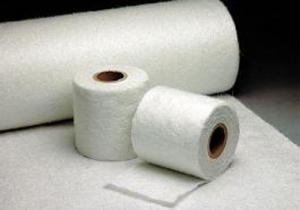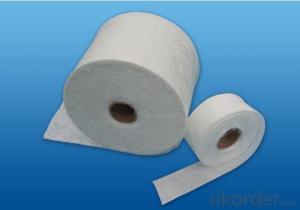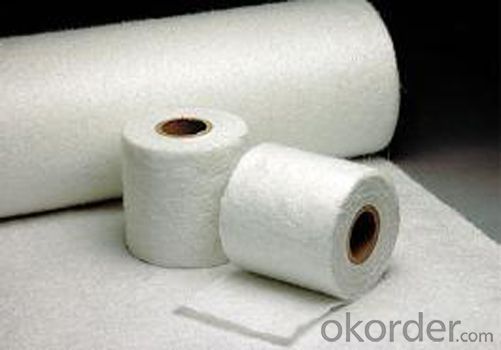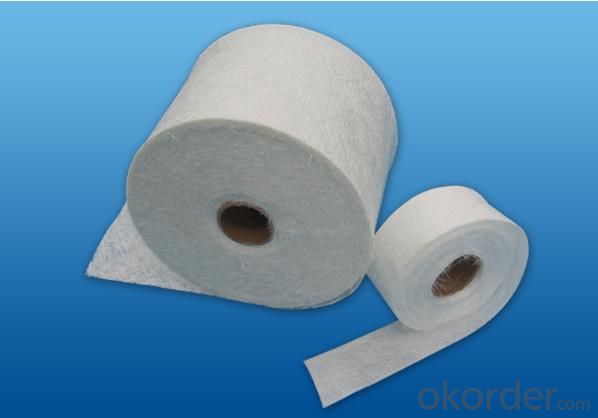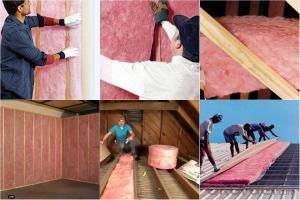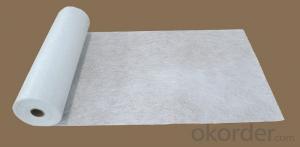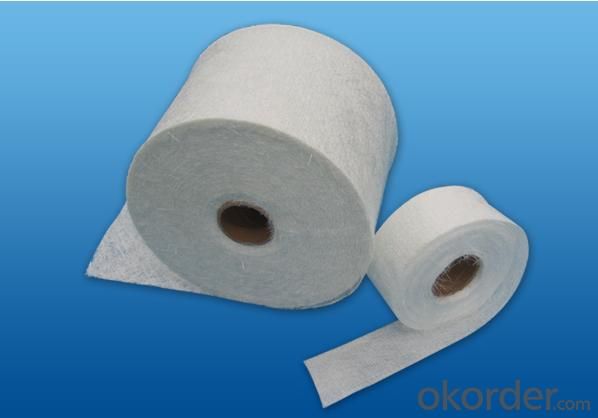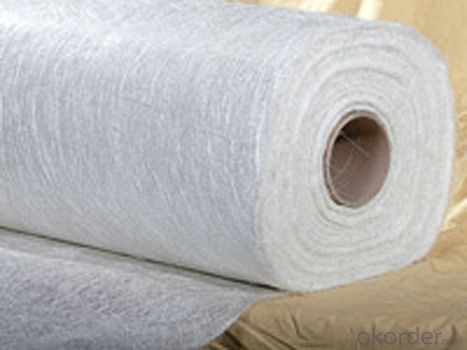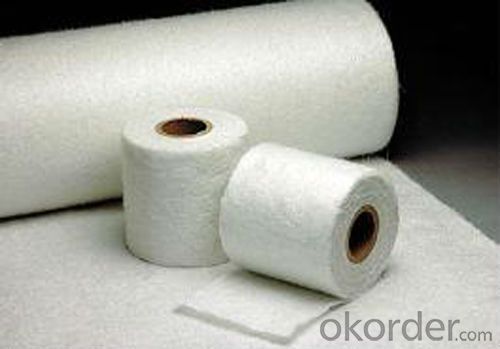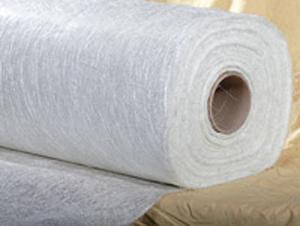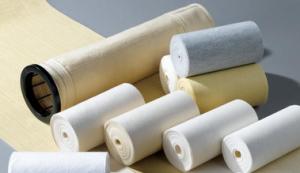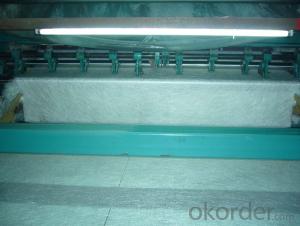Fiberglass Mat Tissue - Fiberglass Stitched Mat 250g 150~2600mm
- Loading Port:
- Shanghai
- Payment Terms:
- TT or LC
- Min Order Qty:
- 5000 m²
- Supply Capability:
- 200000 m²/month
OKorder Service Pledge
OKorder Financial Service
You Might Also Like
Description & application | ||||||||||||||||||||||||
◎ The stitched mat is made of chopped strand which randomly dispersed and be stitched together by polyester thread. The width is available from 150-2400mm.Density of mat generally is 300-600g/m2.
| ||||||||||||||||||||||||
| ||||||||||||||||||||||||
◎ Uniform thickness, good wet tensile strength retention. | ||||||||||||||||||||||||
| ||||||||||||||||||||||||
| ||||||||||||||||||||||||
| ||||||||||||||||||||||||
Each roll is wrapped by PE film and then packed into carton. Stacking in bulk or palletized is available, the pallet shall be no higher than 2 layers. |
FAQ
1) which kind of glass fiber sample and materials can you provide?
We can provide the glass fiber and glass fiber down stream products samples of E glass, C glass, ECR glass, High alkali glass. The products includes single end roving, assembled roving for different applications( Piping, SMC, panel, winding mill plate) , chop strand for BMC, engineering plastic (PA, PPA, PPT, POM, etc), chop strand mat (from 100gsm-900gsm) for automobile and water tank, etc, woven roving (270gsm-800gsm), surface tissue (25-50gsm), multi-axial fabric of different unit weight.
2) Can you provide glass fiber composite material?
We can provide GFRP profile such as grating, T beam, U beam and other assembles pieces such as GFRP triangle frame, dust bin, fireplace, etc
3) How much sample can you provide and who will bear the sample cost?
We can provide the glass fiber samples not more than 1kg free of change. However, the courier cost must be born by the customer. As to the glass fiber composite materials, we can provide the piece not more than 1kg free of change ( with the existing module). However, the courier cost must be born by the customer. If we need to make a new model, this excludes.
4) How can you guarantee the quality?
We only provide the materials that have been approved by many customers and little claim or no claim on it. We have signed the obligation contract with the manufacturer. If the few quality issue happened, we can work with the manufacturer to solve it and customer’s benefit can be guaranteed.
5) Which delivery term will you usually offer?
- Q: How does fiberglass mat tissue compare to other insulation materials?
- Fiberglass mat tissue offers several advantages over other insulation materials. Firstly, it has excellent thermal insulation properties, effectively reducing heat transfer and maintaining indoor temperature. Secondly, it is lightweight and easy to install, making it a cost-effective option. Additionally, fiberglass mat tissue has good sound absorption properties, making it ideal for reducing noise pollution. It is also resistant to fire, mold, and moisture, enhancing its durability and longevity. Overall, fiberglass mat tissue is a versatile and efficient insulation material that outperforms many alternatives in various aspects.
- Q: Can fiberglass mat tissue be used for mold making?
- No, fiberglass mat tissue is not typically used for mold making. Fiberglass mat tissue is a thin, lightweight material made from woven fiberglass strands. It is mainly used for reinforcing and strengthening composite materials, such as fiberglass laminates. For mold making, materials such as silicone rubber, urethane rubber, or latex are commonly used. These materials are flexible and can capture intricate details, making them ideal for creating molds of objects. Additionally, they have good release properties, which allow for easy removal of the mold from the original object. Fiberglass mat tissue, on the other hand, is rigid and does not have the flexibility required for mold making. It is more suitable for applications where strength and reinforcement are needed, rather than capturing detailed shapes or creating molds. Therefore, if you are looking to make molds, it is recommended to choose a material specifically designed for that purpose, rather than using fiberglass mat tissue.
- Q: Does fiberglass mat tissue require any maintenance?
- Fiberglass mat tissue does not typically require any maintenance once it has been installed. This material is designed to be durable and long-lasting, capable of withstanding various environmental conditions. Unlike other materials, fiberglass mat tissue is resistant to rot, corrosion, and decay, making it a low-maintenance option for many applications. However, it is important to note that proper installation is crucial to ensure the longevity and effectiveness of fiberglass mat tissue. It should be installed according to manufacturer guidelines, ensuring that it is properly bonded and sealed to the surface. This will help prevent any potential issues or damage that may arise from improper installation. In some cases, fiberglass mat tissue may require occasional cleaning to remove any dirt or debris that may accumulate over time. This can be done using mild soap and water, or by following the manufacturer's recommended cleaning instructions. Overall, while fiberglass mat tissue does not require regular maintenance, it is important to address any issues or damages promptly to prevent further deterioration. Regular inspections and necessary repairs should be carried out to ensure the continued performance and longevity of the material.
- Q: Can fiberglass mat tissue be used for reinforcing fiberglass pools?
- Yes, fiberglass mat tissue can be used for reinforcing fiberglass pools. It helps enhance the strength and durability of the pool structure by providing added reinforcement to the fiberglass layers.
- Q: Is fiberglass mat tissue resistant to pests and insects?
- Yes, fiberglass mat tissue is resistant to pests and insects.
- Q: Can fiberglass mat tissue be used for swimming pool construction?
- Yes, fiberglass mat tissue can be used for swimming pool construction. It is commonly used as a reinforcement material to provide strength and durability to the pool structure.
- Q: Can fiberglass mat tissue be used for insulation purposes?
- Yes, fiberglass mat tissue can be used for insulation purposes. Fiberglass mat tissue is a lightweight material made from fine strands of glass fibers that are bonded together with a binder. It is commonly used as a reinforcement material in the construction industry, but it can also be used as insulation. Fiberglass mat tissue has excellent thermal insulation properties, making it an effective choice for insulating buildings and other structures. It helps to prevent heat transfer, keeping the interior of a building warm in cold weather and cool in hot weather. Additionally, it is non-combustible, which makes it a safe option for insulation. The flexibility and ease of installation of fiberglass mat tissue make it a popular choice for insulating walls, roofs, and floors. It can be easily cut and shaped to fit different spaces, making it versatile for various construction projects. It is also resistant to moisture, mold, and mildew, ensuring long-lasting insulation performance. In summary, fiberglass mat tissue can indeed be used for insulation purposes. Its thermal insulation properties, non-combustible nature, and ease of installation make it a suitable choice for insulating buildings and improving energy efficiency.
- Q: What are the applications of fiberglass mat tissue?
- Fiberglass mat tissue, a versatile material, is utilized in a multitude of industries. Some notable applications include: 1. Construction and Building Materials: Within the construction industry, fiberglass mat tissue serves as a reinforcement material. It is commonly employed in the production of roofing shingles, insulation materials, and wall coverings. The robust and durable nature of fiberglass mat tissue enhances the structural integrity of buildings and bolsters their resistance to external elements such as wind, moisture, and temperature fluctuations. 2. Automotive Industry: The automotive sector extensively utilizes fiberglass mat tissue for manufacturing components like door panels, headliners, trunk liners, and interior trim parts. Due to its lightweight and high strength properties, fiberglass mat tissue is an ideal material for reducing the overall weight of vehicles while maintaining their structural integrity. 3. Marine Industry: The marine industry relies heavily on fiberglass mat tissue for constructing boat hulls, decks, and other structural components. The corrosion-resistant characteristics of fiberglass mat tissue make it well-suited for marine applications where exposure to water and harsh weather conditions is common. 4. Pipe Manufacturing: Fiberglass mat tissue is employed in the production of fiberglass reinforced pipes. These pipes find applications in various industries, including oil and gas, chemicals, and water management. The high strength and corrosion-resistant properties of fiberglass mat tissue make it an excellent choice for manufacturing pipes capable of withstanding high pressure and harsh chemical environments. 5. Filtration Systems: Fiberglass mat tissue plays a vital role in the production of air filters and liquid filtration systems. The fibrous structure of the material enables efficient filtration by trapping dust particles, dirt, and other contaminants. This makes fiberglass mat tissue the preferred choice for applications requiring high-efficiency filtration, such as HVAC systems, industrial air filters, and water treatment plants. In conclusion, fiberglass mat tissue finds extensive and diverse applications in industries ranging from construction and automotive to marine and filtration systems. Its unique properties make it an invaluable material for enhancing structural integrity, reducing weight, and improving performance across various sectors.
- Q: Is fiberglass mat tissue suitable for agricultural applications?
- Yes, fiberglass mat tissue can be suitable for agricultural applications. It is commonly used in the agricultural industry for various purposes such as reinforcement for greenhouse structures, insulation for livestock housing, and even as a material for composting systems. Its durability, strength, and resistance to weathering make it a viable option for agricultural use.
- Q: Is fiberglass mat tissue recyclable?
- Yes, fiberglass mat tissue is recyclable.
Send your message to us
Fiberglass Mat Tissue - Fiberglass Stitched Mat 250g 150~2600mm
- Loading Port:
- Shanghai
- Payment Terms:
- TT or LC
- Min Order Qty:
- 5000 m²
- Supply Capability:
- 200000 m²/month
OKorder Service Pledge
OKorder Financial Service
Similar products
Hot products
Hot Searches
Related keywords
